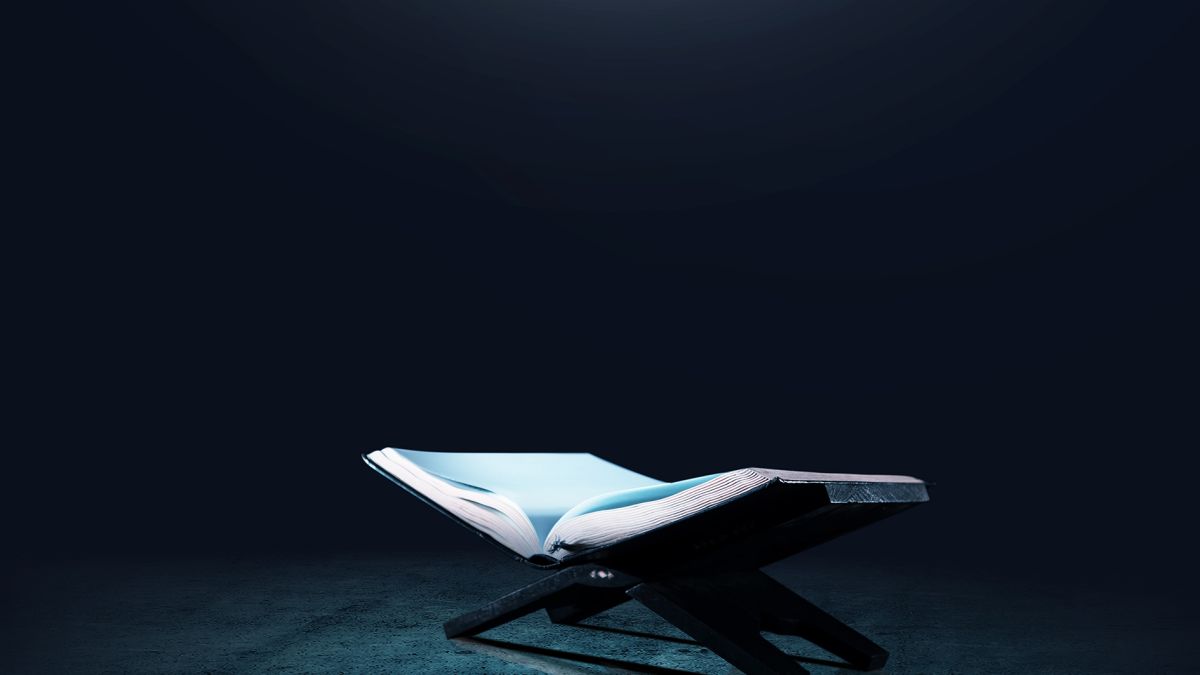The Deviations of the Rāfiḍah Regarding the Noble Qurʾān
Shaykh ʿAli al-Ḥaddādī


I have cited the narration at length so that the noble reader may see these lies and falsehoods in order that he may increase in awareness regarding the Rāfiḍah and their religion. In the present era, al-Khomeini emphasized this belief system regarding the Muṣ‘ḥaf of Fāṭimah, when he said, while counting the things which they are proud of and their extraordinary feats: “We are able to boast regarding the salvation of our Imāms within the month of Shaʿbān; the supplication of Ḥusayn ibn ʿAlī on the Day of ʿArafat, al-Ṣaḥīfah al-Sajjādiyah (the Zabūr of the Family of Muḥammad), and the Ṣaḥīfah of Fāṭimah, the Book revealed by Allāh the Exalted to the Delightful Flower (i.e. Fāṭimah)” We seek refuge with Allāh from deviation and calumny against Him.
Likewise, the Rāfidah have deviated as it relates to grave matters regarding the Noble Qurʾān. From them:
First: The Beliefs of the Rāfidah Regarding the Distortion of the Qurʾān and its Alteration
We believe that all of the Qurʾān has been preserved; its wordings as well as its meanings; nothing has been added to it nor has anything been removed from it; confirming His, the Exalted, statement:
إِنَّا نَحْنُ نَزَّلْنَا الذِّكْرَ وَإِنَّا لَهُ لَحَافِظُونَ
“Verily We: It is We Who have sent down the Dhikr (i.e. the Qur’ân) and surely,
We will guard it (from corruption).”
[Al-Ḥijr 15:9]
As for the Rāfidah, they believe that the Noble Qurʾān which we have, is a distorted book; that it has been subtracted from and added to. Here is some of their speech (regarding this):
ʿAlī ibn Ibrāhīm Al-Qumī, who died in the year 307H said in the introduction to his Tafsīr: “The Qurʾān, from it is that which abrogates and from it is that which is abrogated; from it is that which is clear and from it is that which is ambiguous; from it is that which is general and from it is that which is specific; from it is that which is advanced (speech) and from it is that which is delayed (speech); from it is that which is disconnected and from it that which is connected. It has letters (that have been placed) in the place of other letters, and from it is that which is different from that which Allāh has revealed.” Then he gave examples for this slander of his; saying: “His, the Exalted, statement:
يَا مَرْيَمُ اقْنُتِي لِرَبِّكِ وَاسْجُدِي وَارْكَعِي
“O Mary! Submit yourself with obedience to your Lord (Allāh, by worshipping none but Him Alone) and prostrate yourself, and bow down…”
[Āl ʿImrān, 3:43]
“It is also (read): ‘…bow down and prostrate…’ As for that which is different from that which Allāh has revealed, then it is His, the Exalted, statement:
كُنْتُمْ خَيْرَ أُمَّةٍ أُخْرِجَتْ لِلنَّاسِ تَأْمُرُونَ بِالْمَعْرُوفِ وَتَنْهَوْنَ عَنِ الْمُنْكَرِ
“You are the best of peoples ever raised up for mankind; you enjoin Al-Ma’rûf (i.e. Islamic Monotheism and all that Islām has ordained) and forbid Al-Munkar (polytheism, disbelief and all that Islām has forbidden)…”
[Āl ʿImrān, 3:110]
Abū ʿAbdullāh, upon him be peace, said to someone who recited this verse as: ‘(You are) the best nation…’ (He said): ‘(How are they the best when) they killed the chief of the believers (ʿAlī), Ḥasan, and Husayn the son of ʿAlī!?’ So it was said to him: ‘How was it revealed, O son of Allāh’s Messenger?’ He said: ‘It was revealed: “You are the best Imāms raised up for mankind…’” Then he said: “As for that which is distorted from it, then it is His, statement: ‘However, Allāh bears witness to that which He has revealed to you regarding ʿAlī and the angels also bear witness.’”
In Al-Kāfī it has come on the authority of Abū ʿAbdullāh, upon him be peace, that he said: “The Qurʾān which Jibrīl, upon him be peace, brought to Muḥammad is 17,000 verses.”
I say: The number of verses in the Qurʾān which we have is 6,236 verses in accordance with what has come by way of the people of Kūfah on the authority of Abū ʿAbd al-Raḥmān As-Salamee from ʿAlī ibn Abī Ṭālib, may Allāh be pleased with him, based upon that which was narrated in the book Naadhimah Az-Zahr by Imām Ash-Shaatibee and other than it from the books written regarding the knowledge Al-Fawaasil. On this basis, the verses which have been omitted from the Qurʾān, according to this calumny, is 10,764 verses; and the refuge is with Allāh!
They have a famous author (who wrote a book) in affirmation of the distortion within the Qurʾān; it is titled: Decisive Speech in Affirming the Distortion of the Book of the Lord of Lords. It is written by the Najafī scholar Al-Haaj Mirza Husayn ibn Muḥammad Taqee An-Nūrī At-Tabrisee who died in the year 1320H. The book was printed in Iran in the year 1289H. The Shīʿah rewarded him for this writing of his by burying him within the edifice of the Murtadee Shrine in An-Najaf within the room of the apartment of Banoo Al-Adhmaa, the daughter of the Sultān An-Nāṣir Li-Dīnillāh. It is the lounge of the apartment of the tribe to the right of the entrance to the Murtadee courtyard from the Qiblah door in An-Najaf Al-Ashraf; at the holiest of places according to them.
Indeed Allāh the Exalted sent down the Qurʾān as guidance and mercy for the believers, and as their means of worship with what it contains until the Hour is established. So if there occurred within it distortion, alteration, subtraction, and all this deficiency, then how is it correct that it would remain a book of guidance, mercy, light, and healing?
Here, I present a question only to the intellectuals: If the Rāfidah are angry over the Qurʾān and have reverence for it, then why have they allowed the distorters, as they claim, the opportunity to distort, change, and alter the Qurʾān? Where were those whom they claim to be their Imāms; and at the head of them ʿAlī ibn Abī Ṭālib (may Alāh be pleased with him) and those who came after him-and they are free of that which they have ascribed to them. Where were they as it relates to this distortion and manipulation, while within their hands, as they claim, is full rein over the heavens and the earth, the Dunyā as well as the Hereafter; all of that is subject to their control!?
Second: The Issue of the Descending of the Revelation to Other than the Prophet ﷺ
We believe that the Noble Qurʾān is the last of the divine books and no book will be sent down after it, since Prophethood has ceased and revelation has ceased with the death of the Prophet ﷺ.
In Ṣaḥīḥ Muslim it has come on the authority of Anas that he said: “Abū Bakr (may Allāh be pleased with him) said to ʿUmar, after the death of the Prophet ﷺ: ‘Come with us to Umm Ayman that we may visit her as Allāh’s Messenger ﷺ used to visit her.’ So when we went to her Umm Ayman began to weep. They said to her: ‘What has caused you to weep when Allāh has good in store for His Messenger ﷺ?’ She said: ‘I am not weeping because I do not know that Allāh has good in store for His Messenger ﷺ. However, I am weeping because the revelation has ceased to descend from the heavens.’ She caused them to weep and they began to weep along with her.”
We likewise believe that the revelation of the Qurʾān used to descend upon the Prophet ﷺ and it did not descend upon anyone other than him. As for the Rāfidah, they believe that the revelation would descend upon other than him ﷺ. For this reason, they have a Mus‘haf other than the Noble Qurʾān. Rather, this Qurʾān of ours does not amount to anything as it relates to those manuscripts.
It is mentioned in Al-Kāfī: Chapter: “A Mentioning of As-Saheefah, Al-Jafr, Al-Jāmiʿah, and the Mus‘haf of Fāṭimah, upon her be peace.” A number of our (the Rāfidah’s) companions narrated from Aḥmad ibn Muḥammad from ʿAbdullāh Al-Hijjaal from Aḥmad ibn ʿUmar Al-Halabee on the authority of Abū Baseer that he said: “I entered upon Abū ʿAbdullāh, upon him be peace, and said to him: ‘May I be sacrificed for you; I want to ask you regarding an issue. Is there anyone here who will hear my speech?’ So Abū ʿAbdullāh rose and erected a curtain between himself and the others, and I stepped in. He then said: ‘O Abū Muḥammad; ask what you wish.’ I said: ‘May I be sacrificed for you; indeed your Shīʿah (sect, faction) says that Allāh’s Messenger ﷺ taught ʿAlī, upon him be peace, of a gate which opens to him; by way of it 1000 gates are opened; from every gate there is 1000 (other) gates.’ I said: ‘This, by Allāh, is knowledge.’ He scratched the ground for a time, then he said: ‘Indeed it is knowledge, and that is not it.’ Then he said: ‘O Abū Muḥammad; indeed we have Al-Jāmiʿah. And what will make you know what Al-Jāmiʿah is?’ I said: ‘May I be sacrificed for you; what is Al-Jāmiʿah?’ He said: ‘A scripture the length of which 70 arms lengths of the arms of Allāh’s Messenger ﷺ and its contents is from the dictates of his mouth and what ʿAlī wrote with his right hand. It contains every Hʿalál and Ḥarām and everything which man is in need of; even (in the sphere of) blood money and offenses.’ Then he gestured towards me with his hand and said: ‘Permit me, O Abū Muḥammad?’ I said: May I be sacrificed for you! Indeed, I belong to you, so do as you will.’ So he gestured to me with his hand and said: ‘Even the blood money of this! (as if he was angry)’ I said: ‘This, by Allāh, is knowledge.’ He said: ‘Indeed it is knowledge, and that’s not it.’ Then he remained silent for a while, then he said: ‘Indeed we have Al-Jafr; and what will make you know what Al-Jafr is?’ I said: ‘What is Al-Jafr?’ He said: ‘A receptacle from Ādam which contains the knowledge of the Prophets and the Ambassadors; knowledge of the scholars who have passed from the Children of Isrāʿīl.’ I said: ‘Indeed this is knowledge.’ He said: ‘Indeed this is knowledge; and that’s not it.’ Then he remained silent for a while and said: ‘Indeed we have the Mus‘haf of Fāṭimah, upon her be peace. What will make you know what the Mus‘haf of Fāṭimah, upon her be peace, is?’ I said: ‘What is the Mus‘haf of Fāṭimah, upon her be peace?’ He said: ‘It is a Mus‘haf which contains three times the like of your Qurʾān. Rather, it does not contain one letter of your Qurʾān.’ I said: This, by Allāh, is knowledge.’ He said: ‘Indeed it is knowledge, and that’s not it.’ Then he remained silent for a while and he said: ‘Indeed we have knowledge of what was and knowledge of what is up until the Hour is established.’ I said: ‘May I be sacrificed for you; this indeed is knowledge.’ He said: ‘Indeed it is knowledge, and that’s not it.’ I said: ‘may I be sacrificed for you; what, then, is knowledge?’ He said: ‘(Knowledge of) that which occurs by night and by day; the affair after the affair and the thing after the thing up until the day of Standing.’”
I have cited the narration at length so that the noble reader may see these lies and falsehoods in order that he may increase in awareness regarding the Rāfidah and their religion. In the present era, Al-Khomeini emphasized this belief system regarding the Mus‘haf of Fāṭimah, when he said while counting the things which they are proud of and their extraordinary feats: “We are able to boast regarding the salvation of our Imāms within the month of Sha’baan; the supplication of Husayn ibn ʿAlī on the Day of ‘Arafat, As-Saheefah As-Sajjaadiyah (the Zaboor of the Family of Muḥammad), and the Saheefah of Fāṭimah, the Book revealed by Allāh the Exalted to the Delightful Flower (i.e. Fāṭimah)” We seek refuge with Allāh from deviation and calumny against Him.
Third: The Issue of the Creation of the Qurʾān
Ahl al-Sunnah wal-Jamāʿah believes that the Qurʾān is the Speech of Allāh the Exalted. He spoke with it in truth in a manner that befits the Majesty of Allāh and His Perfection. As He, Glorified and Exalted be He, has said:
وَإِنْ أَحَدٌ مِنَ الْمُشْرِكِينَ اسْتَجَارَكَ فَأَجِرْهُ حَتَّى يَسْمَعَ كَلَامَ اللَّهِ
“And if anyone of the Mushrikūn (polytheists, idolaters, pagans, disbelievers in the Oneness of Allāh) seeks your protection then grant him protection, so that he may hear the Word of Allāh (the Qurʾān)”
[al-Tawbah, 9:6]
However, the Rāfidah negate this reality and believe that the Qurʾān is created like the rest of the things which Allāh the Exalted has created; like the heavens and the earth, the mountains etc. from the created things. This corrupt creed is that which the righteous predecessors combated in the time when the Muʾtazilah manifested it and attacked the people with it by (utilizing) the strength of the ruler. A small number of figureheads of the Sunnah stood firm regarding this, and at their head was the esteemed Imām Aḥmad ibn Ḥanbal, may Allāh have mercy upon him. He stood firm until the smoke cleared and the Fitnah was extinguished.
Al-Majlisee compiled a chapter in Bahaar Al-Anwaar titled: Chapter: That the Qurʾān is Created. The Ayah of the Shīʿah, Musin Al-Amīn said: “The Shīʿah and the Muʾtazilah say that the Qurʾān is created.” Abū Ja’far At-Toosee said: “Within the verse is an evidence that the Qurʾān is not Allāh, and that Allāh he is the contriver of it and All-Capable concerning it…And in it is an evidence that Allāh is capable to do it and that which falls under the Abīlity (of Allāh) then it is an action, and the action is not except contrived (i.e. created).”
It has been transmitted from some of their Imāms that the Qurʾān is not created; however, they interpreted these narrations to mean either:
(a.) They are from the perspective of Taqiyah (i.e. hiding their true beliefs) or
(b.) The statement of the Imām is interpreted to be a negation of lying from the Qurʾān because the meanings of created in the language is: A false statement. This is their claim and it is an absurd claim.
Excerpted from: A Gift to the Sunni in Demolishing the Creed of the Shi’ah
Translated by Raha Batts

















